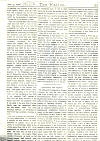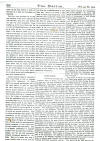|
The phenomenon presented at Harvard University the other day, when young Sidis, a boy of eleven, gave a paper on Four-Dimensional Bodies before the Mathematical Society, is something quite different from that of the arithmetical prodigy, or lightning calculator. By some peculiar endowment, these prodigies are enabled to perform almost instantaneously arithmetical operations which, by the usual processes, involve a great amount of labor. Some of them have even been able to answer, in a few seconds or minutes, questions relating to the decomposition of large numbers into prime factors, which do not admit of being answered by any known mathematical process other than that of repeated and tedious trial. What special faculty makes these feats possible is a mystery upon which, we believe, very little light has been thrown; but it may be set down as certain that the faculty is something very different from intellectual power in the ordinary sense—not only different from general intellectual power, but also different from that special form of intellectual power which is the equipment of the great mathematician. These prodigies are unable to say how they arrive at their results; nor do they build up a system which carries them beyond the achievement of particular feats and leads to the establishment of new truths or of fruitful generalizations. Though the reports of what was actually contained in young Sidis's communication to the Harvard Mathematical Society are too meagre to permit of any appraisal of its value, enough is indicated, both in that report and in the boy's previous history, to show that he possesses extraordinary intellectual power in general and that in particular he has the makings of a great mathematician. If, as it appears, he has discovered—or rediscovered—and demonstrated fundamental theorems concerning figures in four-dimensional space, one cannot help feeling that he gives promise of adding one to the short and splendid list of those whose names are landmarks in the history of mathematics. That list, brief as it is, includes several the early dowering of whose genius is not less remarkable than the greatness of their powers. Pascal, without access to any books or instruction in geometry, constructed for himself, before the age of eleven, a geometrical system substantially equivalent to the first book of Euclid, and before he was sixteen completed a wonderful treatise on conic sections, based chiefly on his own researches; Galois was killed in a duel at the age of twenty, but left behind him work the development of which has given occupation to two generations of mathematicians; William Rowan Hamilton, a prodigy in languages in his early boyhood, acquired, without other teaching than that of the books he seized upon and devoured, such mastery of the most profound parts of mathematics that the astronomer royal for Ireland is said to have declared, "This young man, I do not say will be, but is, the greatest mathematician of the age." Young Sidis's attainments in languages, chemistry, and other subjects, and his later intense devotion to mathematics, suggest the story of Hamilton; and his choice of vector analysis—an outgrowth of Hamilton's quaternoins—as his first subject of study at Harvard, is at least an interesting coincidence. The idea that precocity—or at any rate precocity of any such character as this—generally dies down into mediocrity has very little foundation. Some actually go so far as to think that the very fact of unusual brilliancy in a child at so early an age is a prophecy of little ability when he grows up; a notion that rests upon the same fallacy as that which regards the children of highly gifted parents as less likely to be highly endowed than other children. They are vastly more likely to be thus endowed—as Galton conclusively demonstrated in his "Hereditary Genius"; but great genius is so extremely rare that, in spite of the chances being enormously in their favor, compared with other persons, the children of highly gifted parents have still only a moderate chance of attaining similar distinction. And it is the same way with children who early show great talent. But, of course, there is precocity and precocity; in some cases, we see merely flashes of an early maturity; in others we see early maturity; in others we see early indications of great and unusual powers. Another question raised in connection with young Sidis is that of training versus native endowment. Dr. Boris Sidis, the eminent psychologist who is the boy's father, is said to regard his son's achievements as indicating that by proper methods of instruction several years could be cut off from the time actually employed in bringing boys up to the college or university stage. With the proposition itself we have no particular fault to find; but that young Sidis's exploits serve in any degree to establish it we deny without hesitation. The part played by native genius is so manifestly predominant in this case as to nullify any general application. This is evident on the face of the matter; but confirmation of the strongest kind is given, if any were needed, in such precedents as those of Pascal and Hamilton, both of whom made the amazing mathematical conquests of their youth without any outside help whatsoever. And it is equally unnecessary to consider another view that has been ascribed—though, like the one just mentioned, probably erroneously ascribed—to Dr. Sidis. This is the theory that, with a proper personal hold on a boy, you can turn him out a mathematician or anything else. There is no doubt a wide range in which most young men of intellectual power can freely choose their field of distinction; but it is equally certain that the range is strictly limited in most cases. The faculty for mathematics is as distinctive as that for poetry or music; if you take enough pains, you can train almost anybody of ordinary endowment to turn out verses or to compose some kind of music; but you can't make him a poet or a musician. To be a mathematician you must have mathematical insight, the mathematical vision; and if young Sidis, like young Hamilton, has that along with remarkable gifts for language and other things, this does nothing whatever to disprove the existence of the thousands of boys who, while gifted in other directions, are blind to the beauties and deaf to the harmonies of mathematics. In fact, we are loath to believe that from the performances of one extraordinary child a man of science would feel disposed to draw any conclusion at all that runs counter to the results of the age-long experience of mankind.
|

